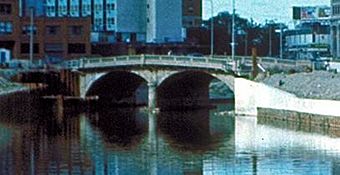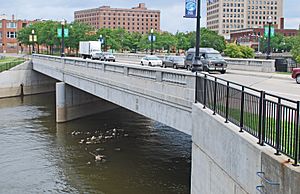Beach-Garland Street-Flint River Bridge facts for kids
Quick facts for kids |
|
|
Beach–Garland Street–Flint River Bridge
|
|

Bridge, in c.1979
|
|
| Location | Beach and Garland streets over Flint River, Flint, Michigan |
|---|---|
| Area | less than one acre |
| Built | 1920 |
| Built by | Illinois Bridge Company |
| Architect | Flint City Engineer's Office, Daniel B. Luten |
| Architectural style | Luten arch bridge |
| Demolished | 2006 |
| MPS | Highway Bridges of Michigan MPS |
| NRHP reference No. | 99001513 |
| Added to NRHP | December 9, 1999 |
The Beach–Garland Street–Flint River Bridge was a special bridge in Flint, Michigan. It helped people cross the Flint River. This bridge was built using a unique design called a Luten arch. It was an important part of Flint's history. The bridge was even listed on the National Register of Historic Places in 1999. It served the city for many years, from 1921 until 2006.
Contents
History of the Bridge
Why a New Bridge Was Needed
Back in 1920, the city of Flint was growing very fast. There were only two main bridges crossing the Flint River. This was not enough for all the cars and people. Traffic was getting very crowded.
To help with this problem, the city decided to build a new bridge. This bridge would connect Garland Street on the north side with Beach Street on the south side.
Designing and Building the Bridge
The city asked Ezra Shoecraft, the City Engineer, to plan the new bridge. Shoecraft then hired Daniel B. Luten, a famous bridge designer from Indianapolis. Luten had designed other bridges in Flint before. One of his designs, the West Second Street–Swartz Creek Bridge, is still standing today.
Luten drew several ideas for the new bridge. The city picked one of his designs. The job to build the bridge went to the Illinois Bridge Company from Chicago. This company had also built other Luten arch bridges in Flint.
Work on the new bridge started in October 1920. It was finished in the fall of 1921.
The Bridge's Later Years
By 2006, the Beach–Garland Street Bridge was getting old. Parts of its concrete were starting to break off. Because of this, the bridge was taken down in the middle of 2006. A new bridge was built in its place.
What the Bridge Looked Like
The Beach–Garland Street Bridge was made of concrete. It had two main arch sections. These arches were built to span 80 feet across the river. They were supported by strong concrete walls on each river bank. There was also a large concrete support in the middle of the river. This middle support had pointed ends to help the water flow around it.
The arches had a smooth, curved shape. They supported a road for cars, which was covered with asphalt. On both sides of the road, there were concrete sidewalks for people to walk on. These sidewalks stuck out slightly over the arch supports. Along the edges of the sidewalks, there were concrete railings. These railings had decorative, classic-looking posts.
Replacement Bridge
The old Beach–Garland Street Bridge was taken down in 2006. A new bridge was built to replace it.



